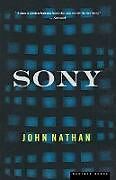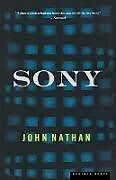Sony
Einband:
Kartonierter Einband
EAN:
9780618126941
Untertitel:
Englisch
Autor:
John Nathan
Herausgeber:
Houghton Mifflin
Anzahl Seiten:
374
Erscheinungsdatum:
05.04.2001
ISBN:
0618126945
Autorentext
John Nathan, the Takashima Professor of Japanese Cultural Studies at the University of California, Santa Barbara, is the author of a definitive biography of the novelist Yukio Mishima and has translated the novels of both Mishima and the Nobel laureate Kenzaburo Oe into English. He is alsoan Emmy Award-winning filmmaker. John Nathanlives in Santa Barbara, California.
Klappentext
Named one of the best business books of the year (by Fortune and Newsweek), SONY is the "intimate biography of one of the world's leading electronics giants" (San Francisco Chronicle) as well as one of the most fascinating and complex of all corporate stories. Drawing on his unmatched expertise in Japanese culture and on unique, unlimited access to Sony's inner sanctum, John Nathan traces Sony's evolution from its inauspicious beginnings amid Tokyo's bomb-scarred ruins to its current worldwide success. "Richly detailed and revealing" (Wall Street Journal), the book examines both the outward successes and, as never before, the mysterious inner workings that have always characterized this company's top ranks. The result is "a different kind of business book, showing how personal relationships shaped one of the century's great global corporations" (Fortune).
Leseprobe
The Founding Fathers: In Pursuit of a Postwar Dream
At the center of the postwar social organism called Sony Corporation stands one of business history's most productive and intriguing relationships. For over forty years, Masaru Ibuka and Aldo Morita grew Sony together, from adjoining offices, reveling in each other's company. Their personal secretaries, women who devoted themselves to their well-being for dozens of years and who remain at work maintaining their deserted offices today, every book and electronic gadget in place, like to remember them facing each other on the rug, playing with a prototype that Ibuka had snatched from the hands of one his engineers and carried upstairs gleefully to show Morita. Sometimes, if one of them had just returned from a trip to America, the focus of their pleasure would be a shopping bag full of actual toys from F.A.0. Schwarz. Ibuka's son, Makoto, recalls somewhat ruefully the mechanical toys his father bought for him on trips abroad; the gifts were handed over only after having been taken apart and reassembled, or partially reassembled, in the office of the president. Morita's second son, Masao, remembers that a visit to the founders' offices was like stepping inside a toy box. His father always purchased two of any toy or mechanical gimmick--an electric potato peeler, for example--one for himself and one for Ibuka. Ibuka had a lifelong passion for electric trains and was president of the Japan Association of Microtrains; for a period of years, a narrow-gauge track was installed along the walls of his office. Morita collected mechanical organs, music boxes, and player pianos. His favorite toy was a remote-controlled helium balloon.
When they were both at work, Ibuka and Morita took lunch together, sometimes inviting someone else to join them in the company dining room. Each knew the other's office as well as his own: Ibuka was an inveterate tinkerer, and as he sat at his desk, fixing a watch or a radio, he would call out to his secretary, "Go into Morita's office and see if there isn't a set of small screwdrivers in the third drawer of his desk."
If Ibuka and Morita had serious disagreements over the years, they resolved them privately. Regarding company policy they spoke with one voice; no one in or outside Sony ever heard either of them criticize the other. Nor has anyone who has ever seen them together failed to remark on the exclusive bond that seemed to unite them in a mysterious way. According to Makoto Ibuka: "They were closer than lovers, even Mrs. Morita felt that. They were bound together by a tie so tight it was more like love than friendship. The connection was so deep that not even their wives could break into it when they were together. Even now, when they're both sick, when Mr. Morita comes to visit my father or my father pays Mr. Morita a visit, they sit together in silence, holding hands, the tears running down their cheeks, and they're communicating without words. That's the kind of friendship they always shared."
Morita's two sons echo Makoto Ibuka's feelings about the bond between their fathers. Hideo Morita, the elder, remembers them at the dining table in his house in Tokyo: "They would sit there, talking to each other, and we would listen but we had no idea what they were saying. Each one seemed to be talking his own story, different from the other's. It was like gibberish to us, but they were understanding each other, and interrupting them for any reason was forbidden!" To Morita's younger brother, Kazuaki, as to many others in and outside the family, the intimacy of the relationship was beyond understanding: "It was truly strange. Men usually get along really well for three or maybe five years and then there's some kind of an argument. But they managed for such a long time, right up against each other, matching perfectly in their work lives and their personal lives. They were incredibly lucky to have found each other. I never saw anything like that combination!"
There were moments of discord, typically the product of tension between Ibuka's impulsiveness and nadveté and Morita's business pragmatism. Most of the anecdotes are trivial, remembered only because they were rare: Ibuka on vacation commandeers a company car in Honolulu and Morita reprimands him; Ibuka decides to sponsor an acquaintance and guarantees a loan from one of Sony's banks, angering Morita. The same variety of conflict was a recurrent theme in the management of the business, as when Ibuka nearly drove the company to ruin in the early 1960s by refusing to abandon the disastrous Chromatron teechnology for color television.
But even then, when Morita was desperately anxious to cut losses, there was never any question that he would attempt to block Ibuka: for Akio Morita, interrrrrfering with a plan conceived by his senior partner, obstructing his dream or vision, or in any way disappointing whatever desire he chose to entertain, however childish or irrational, would always be unthinkable. On the contrary, applying his magical persuasiveness to help Ibuka's visions come to life was in the nature of the relationship.
Morita also considered himself responsible for protecting Ibuka, whom he described as a "pure and simple soul," from those who would exploit his guilelessness. Until he was in his seventies, Ibuka customarily left the office alone when he went out on business. One day at Tokyo Station he went into the public toilet and was approached by a stranger who recognized him and wanted to say hello. When Morita heard, he was sufficiently alarmed to order that a male assistant accompany Ibuka wherever he went.
Morita had a giant, driving appetite for personal success and recognition, but in his relationship to Ibuka, he was clearly able to achieve a degree of selflessness. Hideo Morita sees in his father's devotion to the older man a longing for a big brother. He spoke to me in English: "My father was born the eldest son in a big old family and raised as a prince. All eldest sons in that position need a big brother. I know because I was similar. He had to act as head of family ever since childhood, as if he can do anything, but of course he can't, his life is fall of contradiction. He needed someone he could rely on mentally. Not for decisions or advice; he had people to advise him. Ibuka was not a businessman; he was a great straight dreamer. My father loved him for this: my father loved him for the way he could dream. Ibuka's view was totally different from what my father can ever see, so he was good for him, and he n…

Leider konnten wir für diesen Artikel keine Preise ermitteln ...
billigbuch.ch sucht jetzt für Sie die besten Angebote ...
Die aktuellen Verkaufspreise von 6 Onlineshops werden in Realtime abgefragt.
Sie können das gewünschte Produkt anschliessend direkt beim Anbieter Ihrer Wahl bestellen.
Loading...
Die aktuellen Verkaufspreise von 6 Onlineshops werden in Realtime abgefragt.
Sie können das gewünschte Produkt anschliessend direkt beim Anbieter Ihrer Wahl bestellen.
| # | Onlineshop | Preis CHF | Versand CHF | Total CHF | ||
|---|---|---|---|---|---|---|
| 1 | Seller | 0.00 | 0.00 | 0.00 |
